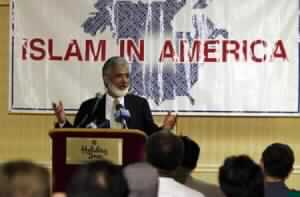A group of Muslim scholars and jurists is visiting the United States to promote better understanding and cooperation with government officials and nongovernment organizations, its leader said Monday. Abdullah bin Abdul Mohsin al-Turki, secretary general of the Muslim World League, said the Sept. 11 attacks have aroused fear and mistrust between Muslim peoples and the West.
Al-Turki said his 16-member group wants to convey "that we are keen on cooperation between the two sides in order to achieve world safety and peaceful coexistence" and that "religion has taken a back seat and has been accused of inciting violence and destruction. We need to promote a culture of dialogue, not confrontation and mistrust."
Speaking at the National Press Club in Washington, al-Turki said that as in other faiths, "There are extremists in Islam but it is unfair to take them as representative of all Muslims." He is a former minister of Islamic affairs in Saudi Arabia and for 16 years was a university rector.
Other members of his group include Sheikh Ahmed Lemo of Nigeria, a former judge; Jaafar Sheikh Idris of Sudan, an academic who serves as a consultant to many Islamic organizations; and Muzammil H. Siddiqi, former president of the Islamic Society of North America.
They are visiting Washington for talks with members of Congress, interfaith groups, nongovernment organizations and media editorial boards after stops in Chicago and New York. Their next destination is Los Angeles.
The Muslim World League, based in Saudi Arabia, is a nongovernmental organization that propagates Islam and tries to refute false allegations against the religion.
PHOTO CAPTION
Sayyid Syeed, secretary general of the Islamic Society of North America, an umbrella organization for Islamic groups throughout the U.S. and Canada, opens the society's regional conference Friday, July 5, 2002, in Rosemont, Ill. The conference will focus on issues ranging from the spread of Islam in American prisons to how Muslims should communicate with people of other faiths. (AP Photo/Mike Fisher)
- Author:
AP - Section:
WORLD HEADLINES


 Home
Home Discover Islam
Discover Islam Quran Recitations
Quran Recitations Lectures
Lectures
 Fatwa
Fatwa Articles
Articles Fiqh
Fiqh E-Books
E-Books Boys & Girls
Boys & Girls  Hajj Rulings
Hajj Rulings Hajj Fatwas
Hajj Fatwas














